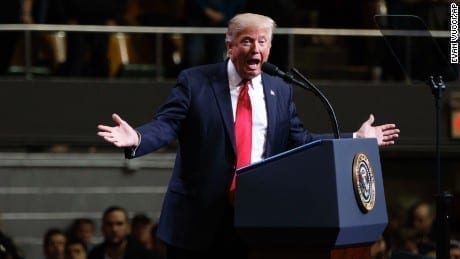A federal judge in Hawaii blocked Donald Trump’s revised travel ban mere hours before it was due to take effect.
In a lengthy ruling, U.S. District Judge Derrick Watson declared that the second version of the ban didn’t appear to be any more legal than the last. Watson sided with critics of the executive order, who claim the action is intended to bar Muslims from entering the United States. The judge wrote that the state of Hawaii had “established a strong likelihood of success” on winning their argument, which centers on religious discrimination.
The president himself described the now-blocked order as a “watered-down” version of the original. Several changes, omissions, and concessions were made to give the ban a fighting chance against the judiciary.
Footage of Donald Trump’s response to the blocking of the travel ban at a Nashville rally held on March 15th; from YouTube.
If the president is to be believed, his executive order was signed into effect as a means to bolster the national security. Claiming that countries such as Sudan, Libya, and Yemen have close ties to terrorism, Trump tried to block citizens of six nations from entering the United States. Iraq had previously been named as a seventh nation in the failed January action but was dropped after Baghdad engaged in intense negotiations with Washington.
Perplexed writers at Vox, The New York Post, and a host of other publications have speculated about why the commander-in-chief chose the six countries that he did. Jennifer Williams of Vox wondered why Saudi Arabia wasn’t being targeted. Of the 19 September 11th hijackers, fifteen were from the Gulf state.
Similar concerns have been raised over the absence of Pakistan and the nations of the North African Maghreb. Pakistan’s intelligence agency, the ISI, has given material support to the Taliban and is suspected of sponsoring large-scale terror attacks in neighboring India.

Egypt, Morocco, and Tunisia have recorded droves of men and women joining ranks with the Islamic State in Iraq and the Levant. Nevertheless, the Trump administration has chosen instead to focus on a handful of financially destitute and war-torn nations like Sudan, Syria, and Somalia.
The largest and wealthiest of the “banned” countries is Iran – a Shi’ite theocracy presided over by Ali Khamenei. Ironically, members of the Shi’ite sect of Islam, which represents the majority of Muslims in Iran, have been extensively persecuted by militant groups such as al-Qaeda and the Islamic State.
Between slapping around diplomatic deadweights and homeless refugees, the Trump administration has had a hard time winning much sympathy from the American public. Massive protests were staged outside of international airports before the first executive order was struck down.
The president is now trying to defend his mission to keep the Muslims at bay by pointing to the deals he struck in drafting the new executive order. Concessions were given to permanent U.S. residents from the banned countries, as well as the holders of valid working and tourism visas. Previously, the media had run wild with stories of families split apart and professors forced to cancel trips abroad for fear of not being allowed back onto American soil.
For now, the liberal critics of the travel ban can rejoice at yet another victory. However, District Judge Derrick Watson did let a glimmering ray of hope peek through to beleaguered conservatives: his block might not last forever.
The Justice Department will have to file an appeal and argue that the travel ban is indeed constitutional and not, as some claim, a ban on Muslims. The president has been keen to point out that plenty of Muslim-majority nations weren’t named in the executive order.
Judge Watson wasn’t so sure.
“The illogic of the Government’s contentions is palpable,” Watson wrote. “The notion that one can demonstrate animus toward any group of people only by targeting all of them at once is fundamentally flawed.”
Until Trump’s top-notch team of legal advisers can find a way to circumvent the law, there isn’t much to be done aside from appealing and appeasing.
The President spent Wednesday evening speaking to a crowd in Nashville. Between the occasional cocking of the head and spirited, sideways hand gestures, Trump, eloquent as ever, lamented “the bad, the sad news” brought to him last night by the courts. It was, yet again, another big league loss.
Sources
Federal judge blocks new travel ban; Trump calls it ‘judicial overreach’
Trump left countries with high terror risk off his banned list
Trump says federal judge’s travel ban block is ‘unprecedented overreach’ – live
Why Trump’s “Muslim ban” won’t stop the terrorism threat


Join the conversation!